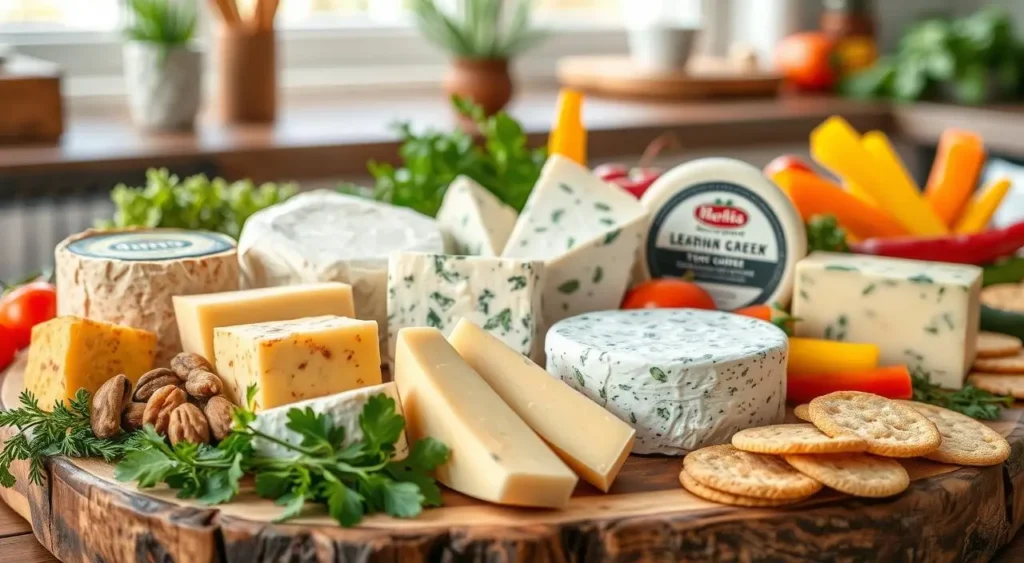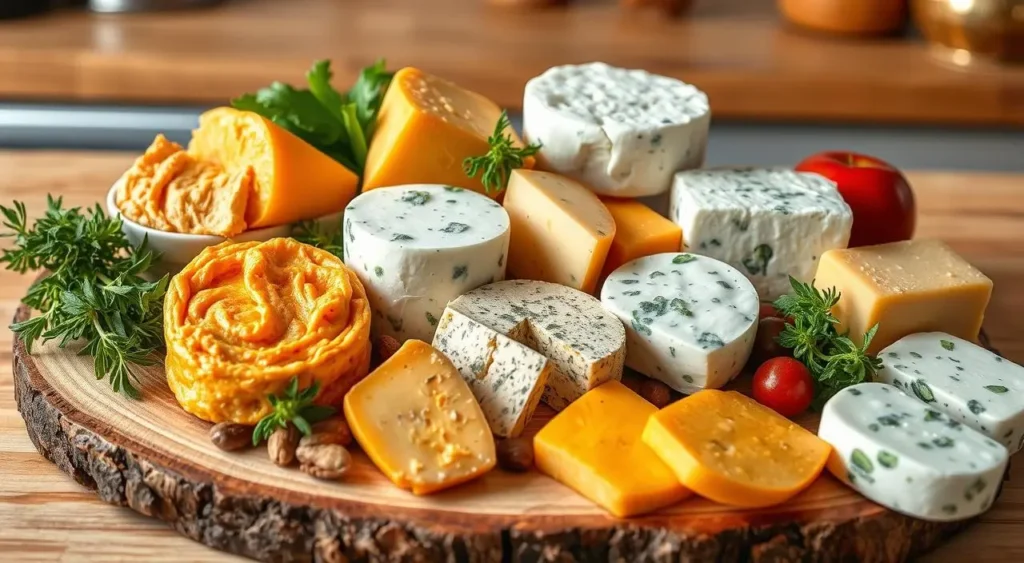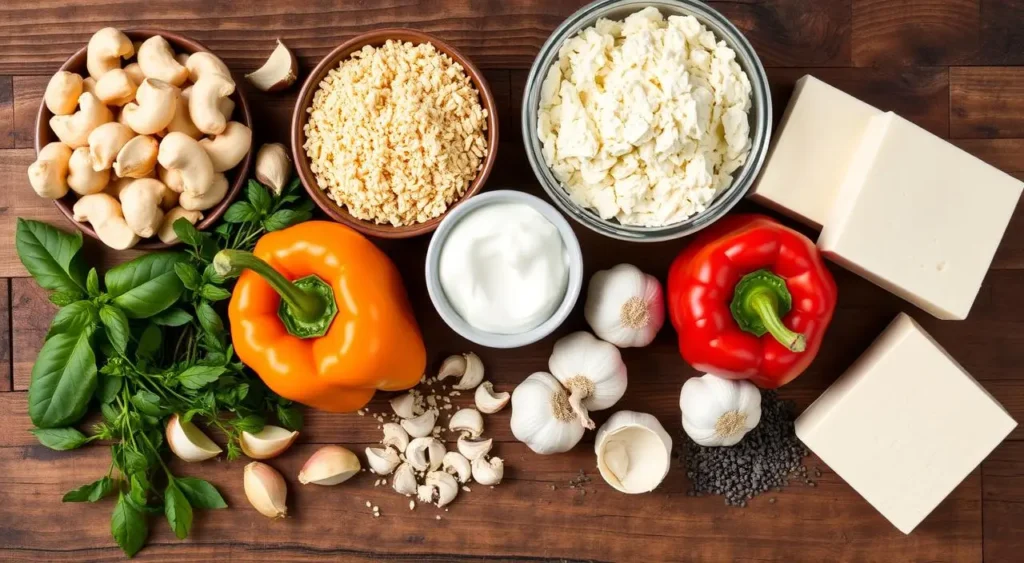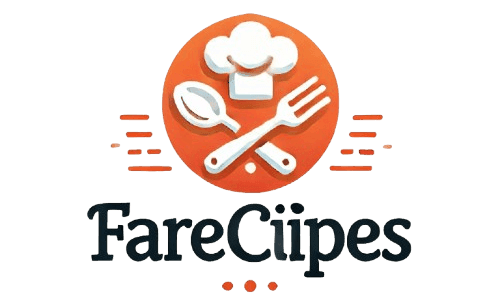Did you know the global market for dairy-free cheese is set to hit $3.9 billion by 2027? This huge growth shows more people want plant-based options for health reasons. Whether you’re a vegetarian, can’t digest lactose, or want to eat less animal products, there’s a lot to try.
This guide will take you through vegetarian cheese’s history and the many dairy-free choices out there. You’ll learn about the health perks they offer. From nut and soy cheeses to new blends that taste like real cheese, you’ll know how to pick the best for you.
Key Takeaways
- The global market for dairy-free cheese is expected to reach $3.9 billion by 2027, reflecting growing consumer demand for plant-based alternatives.
- This guide provides an overview of the origins, evolution, and diverse range of vegetarian cheese options available today.
- Readers will learn about the plant-based ingredients used in dairy-free cheese making, the nutritional benefits of these alternatives, and popular brands leading the charge in the vegetarian cheese market.
- The guide also covers tips for identifying animal rennet-free cheese products and instructions for making your own vegetarian cheese at home.
- Readers will discover the best uses for different types of vegetarian cheese, empowering them to incorporate these dairy-free options into their culinary repertoire.
Understanding Vegetarian Cheese and Its Origins
The history of cheese-making is rich and long. It started with traditional methods that have changed over time. At the core of this process is animal rennet, an enzyme from young animals like calves.

Traditional Cheese-Making Process
The cheese-making journey starts with milk coagulation. Rennet enzyme is key to separating curds from whey. But, for those wanting vegetarian or vegan cheese, this traditional method is a hurdle.
The Role of Animal Rennet
Animal rennet has been crucial in cheese-making for a long time. But, as more people choose ethical and sustainable food, demand for vegetarian cheese alternatives has soared.
Evolution of Vegetarian Alternatives
Cheese makers have created vegetarian cheese alternatives to meet this need. These cheeses use plant-based enzymes or agents like citric acid instead of animal rennet.
| Traditional Cheese-Making | Vegetarian Cheese Alternatives |
|---|---|
| Relies on animal rennet | Utilizes plant-based enzymes or coagulating agents |
| Coagulation process separates curds from whey | Alternative coagulation methods to achieve desired texture |
| Long-established industry standard | Emerging to meet growing consumer demand |
The rise of vegetarian cheese alternatives has opened up new choices for those avoiding dairy. As tastes and values change, cheese-making is evolving to blend tradition with new ideas.
Common Types of Vegetarian Cheese Available Today
The world of vegetarian cheese has grown a lot. Now, there are many dairy-free cheese varieties and plant-based cheese options for different tastes. You can find everything from mozzarella and cheddar to new feta-style cheeses.
Mozzarella-style vegetarian cheese is very popular. It tastes and melts like the real thing. It’s great for pizzas, lasagna, and more.
Cheddar-style cheese is another favorite. It’s perfect for sandwiches, mac and cheese, and baked goods. It adds a creamy, savory flavor.
Feta-style cheese is also popular for its tangy, crumbly texture. It’s great in salads, with Mediterranean dishes, and on roasted veggies.
But there’s more to vegetarian cheese than just these classics. New flavors and textures keep coming out. Whether you’re going dairy-free or just want to try something new, there’s a lot to explore. It can make your cooking and meals even better.
Plant-Based Ingredients Used in Dairy-Free Cheese Making
More people want vegetarian and dairy-free cheese options. Food makers use nuts, seeds, soy, and nutritional yeast to make tasty cheese alternatives. These ingredients are key in making dairy-free cheese.

Nuts and Seeds
Nuts and seeds like cashews, almonds, and macadamia nuts are big in plant-based cheese ingredients. They give a creamy texture like real cheese. By blending these, makers can create many dairy-free cheese types.
Soy-Based Products
Soy ingredients like tofu, tempeh, and soy milk are used in dairy-free cheese making. They have protein like dairy, making them a good choice for nutrition. Soy can make cheese that’s firm or smooth.
Nutritional Yeast and Flavoring Agents
Nutritional yeast adds a cheesy flavor to plant-based cheese. Mixing it with garlic, herbs, and spices lets makers create many flavors. This way, they can meet different tastes.
Using these ingredients and new ways to make cheese, there’s now a wide range of dairy-free cheese options. These options are great for vegetarians, vegans, and those who can’t have lactose.
How to Identify Animal Rennet-Free Cheese Products
Exploring vegetarian cheese options requires knowing how to spot animal rennet-free products. Animal rennet comes from calf stomachs and is found in many cheeses. This makes them not suitable for vegetarians. Luckily, there are ways to find animal rennet-free cheese and make good choices.
Checking the ingredient list is a simple way to find vegetarian cheese labels. Look for cheeses made with plant-based coagulants like microbial rennet or vegetable rennet. Many products will also have a “vegetarian” or “animal rennet-free” label. This makes it easy to know what cheese is vegetarian.
| Vegetarian Cheese Indicator | Meaning |
|---|---|
| Vegetarian | The cheese is made without the use of animal rennet. |
| Microbial Rennet | The cheese is coagulated using enzymes derived from microorganisms, rather than animal rennet. |
| Vegetable Rennet | The cheese is coagulated using enzymes derived from plants, rather than animal rennet. |
Also, look for third-party certifications like the Vegetarian Society or the American Vegetarian Association. These can confirm that the cheese is vegetarian and animal rennet-free.

By reading labels and understanding cheese ingredients, you can find animal rennet-free cheese easily. This helps you make choices that fit your vegetarian lifestyle.
Nutritional Benefits of Vegetarian Cheese Options
The demand for dairy-free cheese is growing. This makes the nutritional value of vegetarian cheese very important for health-conscious people. Plant-based cheese alternatives offer many benefits over traditional dairy cheese.
Protein Content Comparison
One concern about vegetarian cheese is its protein content. Dairy cheese is known for its protein, but plant-based cheese is catching up. For example, a 1-ounce serving of cheddar cheese has about 7 grams of protein. But, a similar serving of cashew-based cheese can have up to 8 grams of plant-based protein.
Calcium and Vitamin Sources
Dairy cheese is also known for its calcium and vitamins. Luckily, dairy-free cheese makers have created products with similar or more nutrients. Many vegetarian cheese options are made with calcium from almonds, coconut, and fortified plant milks. This ensures you get the calcium you need for strong bones.
Health Advantages
Plant-based cheese also has health benefits. It often has less saturated fat and cholesterol than dairy cheese, making it better for your heart. Plus, vegetarian cheese is great for people with dietary restrictions, like those with lactose intolerance or vegans.
The plant-based cheese market is growing fast. This means more choices for people looking for healthy and ethical cheese options.
Popular Brands Making Quality Dairy-Free Alternatives
More and more people are looking for vegetarian cheese brands and dairy-free cheese manufacturers. Several big plant-based cheese companies are answering this call. They offer a variety of tasty and healthy cheese alternatives. These include creamy nut-based cheeses and flavorful soy-based cheeses.
Miyoko’s Creamery from California is a leader in cashew-based cheeses. They make everything from artisanal wheels to mozzarella-style shreds. People love their products, whether they eat meat or not. Violife from Greece is also well-known for its wide range of dairy-free cheeses. They have everything from feta-style crumbles to cheddar-like slices.
- Treeline Treenut Cheese: Offers a variety of nut-based cheeses, including aged varieties and spreadable options.
- Follow Your Heart: This brand is renowned for its innovative soy-based cheese products, including shreds, blocks, and cream cheese alternatives.
- Daiya Foods: A pioneer in the dairy-free cheese manufacturers space, Daiya produces a wide array of meltable, sliceable, and spreadable cheese alternatives.

These top vegetarian cheese brands have made it easier for people to find dairy-free options. They’ve also made these options taste better and be healthier. As more people choose plant-based eating, the dairy-free cheese market is looking up.
“The rise of plant-based cheese companies has been a game-changer for those of us who want to enjoy the taste and texture of cheese without the use of animal products.”
Making Your Own Vegetarian Cheese at Home
Making your own vegetarian cheese at home is rewarding and fun. You’ll need the right tools and techniques to start. This guide will help you with simple and complex recipes.
Essential Equipment
To start making vegetarian cheese, you’ll need a few things:
- High-speed blender or food processor
- Cheese mold or small container
- Cheesecloth or muslin cloth
- Aging box or container (for hard cheeses)
- Thermometer
Basic Techniques
Here’s how to make vegetarian cheese at home:
- Blend plant-based ingredients (like nuts or soy) to make a smooth base.
- Heat and curdle the mixture to separate the solids (curds) from the liquid (whey).
- Strain the curds using cheesecloth or a muslin cloth, gently pressing to remove excess liquid.
- Shape the curds into desired forms or molds and allow them to age (for harder cheeses).
- Season the cheese with herbs, spices, or other flavorings as desired.
Troubleshooting Tips
When making vegetarian cheese, you might face some challenges. Here are tips to help:
- Texture issues: If your cheese is too soft or crumbly, try adjusting the blending time or adding a small amount of thickening agent, such as agar agar or guar gum.
- Flavor imbalance: Experiment with different ratios of plant-based ingredients and seasonings to find the perfect flavor profile for your taste preferences.
- Aging difficulties: Ensure your aging environment has the right temperature and humidity levels to achieve the desired texture and flavor development.
The fun of making vegetarian cheese is in experimenting and personalizing. Enjoy the process and the delicious results of your dairy-free cheese-making efforts.
Best Uses for Different Types of Vegetarian Cheese
Vegetarian cheese is great for many dishes, offering tasty flavors and textures. You can use it in various ways, from cooking to baking. It’s perfect for those who love dairy-free options.
Soft cheeses are great in sandwiches, wraps, and salads. They add a creamy, indulgent touch. On the other hand, firmer cheeses are perfect for pizzas, pasta, and casseroles. They melt well, creating a gooey texture.
Spreadable vegan cheese is amazing as a dip or spread. It’s perfect for crackers, veggies, and bread. This cheese adds a delicious twist to any snack.
Try using dairy-free cheese in your favorite dishes. It’s great for grilled cheese, mac and cheese, lasagna, and quiche. Vegetarian cheese lets you enjoy comfort foods without dairy or animal products.
FAQ
What cheese is vegetarian?
Vegetarian cheeses don’t use animal rennet. This enzyme comes from young animals like calves. Instead, they use microbial or vegetable rennet. This makes the cheese without animal products.
What cheese has no animal rennet?
Cheeses labeled “vegetarian” or “animal rennet-free” don’t use animal rennet. Examples include mozzarella, cheddar, brie, and gouda made from nuts, seeds, soy, and nutritional yeast.
How can I identify vegetarian cheese products?
Look for “vegetarian” or “no animal rennet” on the label. Check the ingredient list for animal rennet. Some products have the Vegetarian Society logo or Vegan Society trademark, showing they’re suitable for vegetarians and vegans.
What are the nutritional benefits of vegetarian cheese?
Vegetarian cheese alternatives have similar protein to dairy cheese, from nuts, seeds, and soy. They might also have more calcium, vitamin B12, and healthy fats, depending on the ingredients.
What are some popular brands making quality dairy-free cheese alternatives?
Brands like Daiya, Treeline, Miyoko’s Creamery, Follow Your Heart, and Violife make great vegetarian cheese. They offer a variety of cheese styles, from mozzarella and cheddar to feta and cream cheese, for those who prefer plant-based options.

